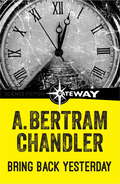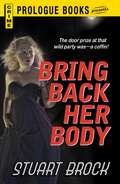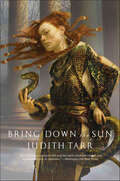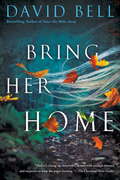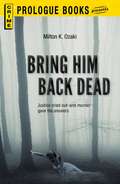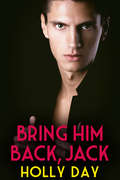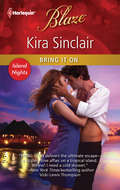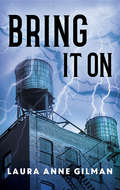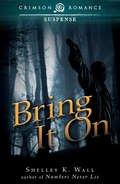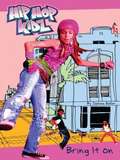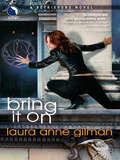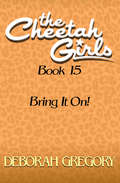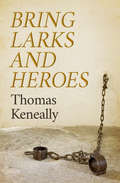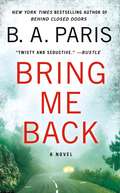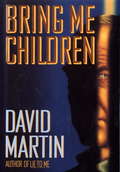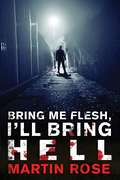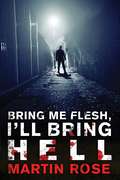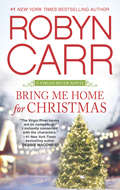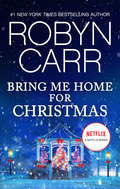- Table View
- List View
Bring Back Yesterday
by A. Bertram ChandlerHAUNTED BY THE PAST, JOHN PETERSEN WOULD GIVE ANYTHING TO TURN BACK THE CLOCK...OR WOULD HE?When Lightning blasts off without him, Second Officer John Petersen is finished as far as Trans-Galactic Clippers are concerned. Branded a deserter, stranded on Carinthia and desperate for a job, there are very few places left to go. The Rim Runners would have him - they'll have anyone who's still warm and can flash some kind of certificate. But there may be a less than unpleasant alternative...Private detective Steve Vynalek needs Petersen. Has a fanatical scientist on the planet Wenceslaus really found a way to beat the time travel problem, a way to bring back yesterday? The Presidents of Carinthia and Vynalek are convinced that Petersen is the only man for the job. In the airless wastes of Wenceslaus, Petersen finds himself reliving the past, trapped in a terrible cycle of familiarity - a cycle that only he can break.
Bring Back her Body
by Stuart Brock"I want Paula or her body-I dont care which. " This was the command of her wealthy, ruthless father. But Abel Cain, who undertook the search, found that he had been presented with only one side of the ugly truth. There were others looking for the hidden heiress too, and among them were the forces of jealousy, greed, and murderous vengeance. When and island orgy held by Paulas friends backfired and the two-faced revelers uncovered a surprise coffin, Cain found the key to his puzzle, one that pointed to something terribly simple and utterly evil. This new novel, an ACE Original, presents some saucy humor, stalking females, and a bevy of up-to-no-good sophisticates thrown against background of fast action and awesome terror. It will keep you guessing and breathless all the way.
Bring Down the Sun (The Novels of Alexander the Great)
by Judith TarrAlexander the Great ruled the greatest Empire of the ancient world, but he was ruled by his mother, called Olympias. There are as many legends about this powerful Queen as there are of her famous son, and the stories began long before she even met Philip of Macedon.Priestess of the Great Goddess, daughter of ruling house of Epiros, witch, and familiar of Serpents...she was a figure of mystery, fascination, and fear even during her own lifetime. Author Judith Tarr weaves the legends into an intensely romantic fantasy novel set in ancient Greece and Macedon.At the Publisher's request, this title is being sold without Digital Rights Management Software (DRM) applied.
Bring Her Home
by David BellIn the breathtaking new thriller from David Bell, bestselling author of Since She Went Away and Somebody I Used to Know, the fate of two missing teenage girls becomes a father’s worst nightmare.... Just a year and a half after the tragic death of his wife, Bill Price’s fifteen-year-old daughter, Summer, and her best friend, Haley, disappear. Days later, the girls are found in a city park. Haley is dead at the scene, while Summer is left beaten beyond recognition and clinging to life. As Bill holds vigil over Summer’s bandaged body, the only sound the unconscious girl can make is one cryptic and chilling word: No. And the more time Bill spends with Summer, the more he wonders what happened to her. Or if the injured girl in the hospital bed is really his daughter at all. When troubling new questions about Summer’s life surface, Bill is not prepared for the aftershocks. He’ll soon discover that both the living and the dead have secrets. And that searching for the truth will tear open old wounds that pierce straight to the heart of his family... READERS GUIDE INCLUDED
Bring Him Back Dead
by Day KeeneHe was as rare as a three-dollar bill . . . an honest man in the town of French Bayou - that was crowding Phenix City out of corruption's first place.He was young Deputy Sheriff Andy Latour, with enough stern morality for someone to have set an assassin on his trail.But Latour dodged the bullets, and now it was urgent that his voice be silenced. So - a phone call in the night, a drive out of town, the thud of a blackjack.And when Latour woke to daylight he was ringed around by hard, watchful men, accused of the brutal rape of a gorgeous young redhead - and the murder of her aged husband.And even when Latour crashed jail, the word went out to bring him back dead . . .
Bring Him Back Dead
by Day KeeneHe was as rare as a three-dollar bill . . . an honest man in the town of French Bayou - that was crowding Phenix City out of corruption's first place.He was young Deputy Sheriff Andy Latour, with enough stern morality for someone to have set an assassin on his trail.But Latour dodged the bullets, and now it was urgent that his voice be silenced. So - a phone call in the night, a drive out of town, the thud of a blackjack.And when Latour woke to daylight he was ringed around by hard, watchful men, accused of the brutal rape of a gorgeous young redhead - and the murder of her aged husband.And even when Latour crashed jail, the word went out to bring him back dead . . .
Bring Him Back Dead
by Day KeeneHe was as rare as a three-dollar bill . . . an honest man in the town of French Bayou - that was crowding Phenix City out of corruption’s first place.He was young Deputy Sheriff Andy Latour, with enough stern morality for someone to have set an assassin on his trail.But Latour dodged the bullets, and now it was urgent that his voice be silenced. So - a phone call in the night, a drive out of town, the thud of a blackjack.And when Latour woke to daylight he was ringed around by hard, watchful men, accused of the brutal rape of a gorgeous young redhead - and the murder of her aged husband.And even when Latour crashed jail, the word went out to bring him back dead . . .
Bring Him Back, Jack
by Holly DayOnce every century, a shadow walker is born. Ivan Charna is that shadow walker, and he and his sister Raina are on the run from wizards who want to sacrifice their blood in some crazy rite. They never stay long in one place, and they do their best not to stand out. When Raina loses a bet, Ivan is forced to work off her debt, and they have to stay put. As long as no wizard figures out what they are, Ivan doesn’t mind all that much since he gets to work with his favorite vampire.Malik lives in a cell in a basement. He’s never allowed to go anywhere without chains around his wrists and ankles, and there is a stake hovering over his heart at all times. Master can trigger the stake with a push of a button. He doesn’t even have to be in the same room to do it. Malik dreams of a different life, a life with Ivan, but he’s a vampire, and vampires have to do what their masters tell them.Ivan only has to steal one last diamond, then the debt is paid, and he and Raina can leave town. It should be easy, but when Remington Redwood, the man Raina owes money, insists on having Malik shadow his every step, it complicates things. Malik might dream about making Ivan his, but getting him away from Master alive has to be enough. Ivan knows it’s a stupid risk to take, but if he’s stealing a diamond, what’s to say he can’t steal a giant vampire too?
Bring Him Home
by Karina BlissClaire Langford is ready to move on. She's grieved for her late husband, and now it's time she made a different life for herself and her kid. She's got a new business in the works that should accomplish that. Before the plan gets off the ground, however, she needs Nate Wyatt's help. First she has to track the man down, then drag him to New Zealand.Too bad Nate is complicated times ten. Given how difficult it was to persuade him to make the trip, she's not prepared for his kindness, his support...his captivating attention. And she's definitely not prepared to fall for him! But it just might be too late to stop that from happening....
Bring It On
by Kira SinclairBreeze in to Escape, where every sense is seduced and every desire is fulfilled...This adults-only Caribbean island resort may cater to your every need, but it's also a business. And what could be better advertising than tantalizing photos of a real couple on their honeymoon?Unless, of course, the couple is faking it...Graphic designer Lena Fuller fled the chaos of her ruined wedding with her best friend, filmmaker Colt Douglas. But she wasn't expecting the "honeymoon" her ex arranged would be a weeklong photo shoot. As the sets become more intimate, Lena and Colt find that their libidos are slipping deliciously out of control. Sure, they can fake it...but when the week is over, will they be able to forget it?
Bring It On
by Kira SinclairBreeze in to Escape, where every sense is seduced and every desire is fulfilled...This adults-only Caribbean island resort may cater to your every need, but it's also a business.<P><P> And what could be better advertising than tantalizing photos of a real couple on their honeymoon?Unless, of course, the couple is faking it...Graphic designer Lena Fuller fled the chaos of her ruined wedding with her best friend, filmmaker Colt Douglas. But she wasn't expecting the "honeymoon" her ex arranged would be a weeklong photo shoot. As the sets become more intimate, Lena and Colt find that their libidos are slipping deliciously out of control. Sure, they can fake it...but when the week is over, will they be able to forget it?
Bring It On
by Laura Anne GilmanReturn to the world of the Retrievers and the Cosa Nostradamus, in book 3 of the popular series by Laura Anne Gilman.Wren Valere used to have a simple life. Her partner Sergei would negotiate the terms of the Retrieval—all right, the theft—and she would use her magical Talent to carry it out. Paycheck deposited, on to the next job. Now? Her relationship with Sergei is even more complicated (sex will do that). Her fellow lonejacks are trying to organize against the Mage’s Council. The nonhuman population of Manhattan is getting fed up with being ignored and abused. And the Council? Well, they have an agenda of their own, and it’s not one the lonejacks are going to like. When it comes down to choosing sides, the first rule of the lonejack credo is "Don’t get involved." But when friends are in danger, and the city you love is at risk, sometimes getting into the thick of things is all you can do…Originally published in 2006
Bring It On
by Shelley K. WallKathryn Delroy thinks the management training session she's been asked to attend will be a dream come true. The excitement hits a new level when an old family friend, Thomas Ryan, shows up as well.When the training ends, their passion for each other finds them stranded in a cabin in the Alaskan mountains - a cabin that belongs to a wanted fugitive. When they discover documents that identify illegal activities, they panic and report what they've found to the FBI.Kathryn and Thomas end up on a dash for their lives, protected by federal agents. The man believed to be chasing them is contracted to manipulate political and financial agendas through physical violence - and death. Cross-country travels and high-stakes mountain adventures are only part of the trials they face as they attempt to build a relationship and stay alive.Sensuality Level: Behind Closed Doors
Bring It On
by Shelley K. WallKathryn Delroy thinks the management training session she's been asked to attend will be a dream come true. The excitement hits a new level when an old family friend, Thomas Ryan, shows up as well.When the training ends, their passion for each other finds them stranded in a cabin in the Alaskan mountains - a cabin that belongs to a wanted fugitive. When they discover documents that identify illegal activities, they panic and report what they've found to the FBI.Kathryn and Thomas end up on a dash for their lives, protected by federal agents. The man believed to be chasing them is contracted to manipulate political and financial agendas through physical violence - and death. Cross-country travels and high-stakes mountain adventures are only part of the trials they face as they attempt to build a relationship and stay alive.Sensuality Level: Behind Closed Doors
Bring It On #1
by Jasmine BellerResident diva Devane will stop at nothing to get the star treatment she feels she deserves. Especially when she's overlooked for a solo in the group's first show and Emerson, her nemesis, isn't. During the performance, Devane does the unthinkable—she steals the scene from Emerson—and is thrown out of the group. But in the end, it's the group who could end up suffering. Devane may be an egomaniac, but she's also an unbelievable dancer. The Hip Hop Kidz need her, and Emerson might be the only one who can convince her to come back.
Bring It On (Retrievers #3)
by Laura Anne GilmanNobody said juggling a career and a relationship would be easy. . . Wren Valere used to have a simple life. Her partner Sergei would negotiate the terms of the Retrieval - all right, thetheft - and she would use her magical Talent to carry it out. Paycheck deposited, on to the next job. Now? Her relationship with Sergei is even more complicated (sex will do that). Her fellow lonejacks are trying to organize against the Mage's Council. The nonhuman population of Manhattan is getting fed up with being ignored and abused. And the Council? Well, they have an agenda of their own, and it's not one the lonejacks are going to like. And Sergei is far too involved with the Silence, his former employers, for Wren's liking. When it comes down to choosing sides, the first rule of the lonejack credo is "Don't get involved. " But when friends are in danger, and the city you love is at risk, sometimes getting into the thick of things is all you can do. ...
Bring It On: Bring It On (The Cheetah Girls #15)
by Deborah GregoryAfter winning the talent competition at the Harlem School of the Arts, the Cheetah Girls have cred uptown and down. Dorinda, the most stylish Cheetah of all, thinks they&’re finally on their way to music industry millions. But just when things are clicking for the Cheetahs, Dorinda&’s home life threatens to come apart at the seams.Dorinda lives in foster care with almost a dozen other children, and even though Mr. and Mrs. Bosco aren&’t their real parents, they&’re the only family these kids have ever known. So when a mysterious man comes demanding custody of one of Dorinda&’s brothers, she decides to fight back the only way she knows how: Cheetah style!
Bring Larks and Heroes
by Thomas KeneallySet in a remote British penal colony in the late eighteenth century, Bring Larks and Heroes explores the early years of European settlement of desperate men and corrupt soldiers to Australia, the world's end. Corporal Phelim Halloran, an honest man, poet and lover, attempts to make a home for himself while confronting the demands of his secret bride, a convict-artist, his Irish comrades, and his own conscience. Can he overcome the hellish, sun-parched landscape to believe in something greater than his own existence?
Bring Me Back: A Novel
by B.A. ParisTHE NEW TWISTY, GRIPPING READ FROM B.A. PARIS, THE AUTHOR OF THE INSTANT NEW YORK TIMES AND USA TODAY BESTSELLING NOVELS BEHIND CLOSED DOORS AND THE BREAKDOWN“We’re in a new Golden Age of suspense writing now, because of amazing books like Bring Me Back, and I for one am loving it.” —Lee Child"[An] outstanding Hitchcockian thriller.” —Publishers Weekly (starred review)She went missing. He moved on. A whole world of secrets remained—until now.Finn and Layla are young, in love, and on vacation. They’re driving along the highway when Finn decides to stop at a service station to use the restroom. He hops out of the car, locks the doors behind him, and goes inside. When he returns Layla is gone—never to be seen again. That is the story Finn told to the police. But it is not the whole story.Ten years later Finn is engaged to Layla’s sister, Ellen. Their shared grief over what happened to Layla drew them close and now they intend to remain together. Still, there’s something about Ellen that Finn has never fully understood. His heart wants to believe that she is the one for him...even though a sixth sense tells him not to trust her.Then, not long before he and Ellen are to be married, Finn gets a phone call. Someone from his past has seen Layla—hiding in plain sight. There are other odd occurrences: Long-lost items from Layla’s past that keep turning up around Finn and Ellen’s house. Emails from strangers who seem to know too much. Secret messages, clues, warnings. If Layla is alive—and on Finn’s trail—what does she want? And how much does she know?A tour de force of psychological suspense, Bring Me Back will have you questioning everything and everyone until its stunning climax.
Bring Me Children
by David MartinJohn Lyon, a veteran but emotionally unstable newscaster, is drawn into a sinister web of evil in the heart of Appalachia when he investigates a woman's bizarre story about a West Virginia doctor who has been killing babies.
Bring Me Flesh, I'll Bring Hell: A Horror Novel (Vitus Adamson Ser. #1)
by Martin RoseVitus Adamson is falling apart. As a pre-deceased private investigator, he takes the prescription Atroxipine hourly to keep his undead body upright and functioning. Whenever he is injured, he seeks Niko, a bombshell mortician with bedroom eyes and a way with corpses, to piece him back together. Decomposition, however, is the least of his worries when two clients posing his most dangerous job yet appear at his door looking for their lost son.Vitus is horrified to discover the photo of the couple's missing son is a picture-perfect reproduction of his long dead son. This leads him to question the events of his tormented past; he must face the possibility that the wife and child he believed he murdered ten years ago in a zombie-fugue have somehow survived . . . or is it just wishful thinking designed to pull him into an elaborate trap?
Bring Me Flesh, I'll Bring Hell: A Horror Novel (Vitus Adamson Ser. #1)
by Martin RoseVitus Adamson is falling apart. As a pre-deceased private investigator, he takes the prescription Atroxipine hourly to keep his undead body upright and functioning. Whenever he is injured, he seeks Niko, a bombshell mortician with bedroom eyes and a way with corpses, to piece him back together. Decomposition, however, is the least of his worries when two clients posing his most dangerous job yet appear at his door looking for their lost son.Vitus is horrified to discover the photo of the couple's missing son is a picture-perfect reproduction of his long dead son. This leads him to question the events of his tormented past; he must face the possibility that the wife and child he believed he murdered ten years ago in a zombie-fugue have somehow survived . . . or is it just wishful thinking designed to pull him into an elaborate trap?Unfolding like a classic film noir mixed with elements of a B-movie, Bring Me Flesh, I'll Bring Hell is an imaginative spin on the hard-boiled detective genre and a new twist on the zombie novel. In Vitus Adamson, you will find a protagonist you can care about and invest in as he takes you through his emotional journey of betrayal and quest for redemption.
Bring Me His Ears
by Clarence E. MulfordThe year is 1840, and young frontiersman Tom Boyd is planning a trip to the Oregon territory. All of that is about to change, because Tom sees a beautiful young woman whom he decides to follow wherever she may go. Her destination is the city of Santa Fe, deep inside the New Mexico territory. Her father, whom she hasn't seen in five years, conducts a trading operation there and she plans to go with her Uncle Joe who is taking several wagonloads of trade goods to his brother. Santa Fe, New Mexico, is the last place Tom Boyd should consider visiting, because the leading dignitary of that city has a vengeful grudge against him, and wants him either as a captive, or he wants his minions to "BRING ME HIS EARS"! The Mexican-American War is still six years in the future, and the 13-day battle of The Alamo is four years in the past, and Boyd decides against all reason to travel to Santa Fe as the silent protector of the young woman. Several of Boyd's mountaineer friends decide to accompany him, and adventure follows adventure as they head for the New Mexico territory.
Bring Me Home for Christmas (Virgin River #16)
by Robyn CarrThis year, Becca Timm knows the number one item on her Christmas wish list-getting over Denny Cutler. Three years ago, Denny broke her heart before heading off to war. It's time she got over her silly high-school relationship and moved on.So she takes matters into her own hands and heads up to Virgin River, the rugged little mountain town that Denny calls home, as an uninvited guest on her brother's men-only hunting weekend. But when an accident turns her impromptu visit into an extended stay, Becca finds herself stranded in Virgin River. With Denny. In very close quarters.As the power of Christmas envelops the little town, Becca discovers that the boy she once loved has become a strong and confident man. And the most delicious Christmas present she can imagine.
Bring Me Home for Christmas: Promise Canyon Wild Man Creek Harvest Moon Bring Me Home For Christmas (A Virgin River Novel #14)
by Robyn CarrCome back to celebrate the holidays in Virgin River, the beloved town from the series by #1 New York Times bestselling author Robyn Carr.This year, Becca Timm knows the number one item on her Christmas wish list—getting over Denny Cutler. Three years ago Denny broke her heart before heading off to war. It’s time she got over her silly college relationship and moved on. So she takes matters into her own hands and heads up to Virgin River, the rugged little mountain town that Denny calls home, as an uninvited guest on her brother’s men-only hunting weekend. But when an accident turns her impromptu visit into an extended stay, Becca finds herself stranded in Virgin River. With Denny. In very close quarters. As the power of Christmas envelops the little town, Becca discovers that the boy she once loved has become a strong and confident man. And the most delicious Christmas present she can imagine.Originally published in 2011
